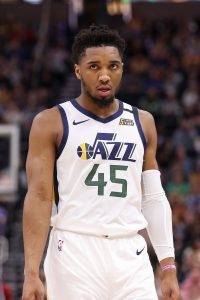The NBA salary cap is somewhat malleable, with various exceptions allowing every team to surpass the $109,140,000 threshold once their room is used up. In some cases, teams blow past not only the cap limit, but the luxury-tax limit of $132,627,000 as well — the Warriors project to have a nine-figure tax bill this season as a result of their spending.
The NBA doesn’t have a “hard cap” by default, which allows a club like Golden State to build a significant payroll without violating CBA rules. However, there are certain scenarios in which teams can be hard-capped, as we explain in a glossary entry.
When a club uses the bi-annual exception, acquires a player via sign-and-trade, or uses more than the taxpayer portion ($5,718,000) of the mid-level exception, that club will face a hard cap for the remainder of the league year.
When a team becomes hard-capped, it cannot exceed the “tax apron” at any point during the rest of the league year. The tax apron was set $6MM above the luxury tax line in 2017/18 (the first year of the current Collective Bargaining Agreement) and creeps up a little higher each time the cap increases. For the 2020/21 league year, the tax apron – and hard cap for certain clubs – is set at $138,928,000.
More than half the teams in the NBA have been willing to hard-cap themselves this offseason, and in some cases, it will significantly impact a team’s ability to add further reinforcements later in the league year. The Bucks and Lakers are among the teams right up against the hard cap, which may prevent them from being players in free agency during the season unless they can shed salary.
For other clubs, the hard cap is just a technicality that won’t affect their plans. The Hawks and Thunder are among the hard-capped clubs that will have zero practical concerns about reaching that threshold in 2020/21.
Listed below are the hard-capped teams for the 2020/21 league year, along with how they created a hard cap.
Atlanta Hawks
- Acquired Danilo Gallinari from the Thunder via sign-and-trade.
Boston Celtics
- Using non-taxpayer mid-level exception on Tristan Thompson.
Charlotte Hornets
- Acquired Gordon Hayward from the Celtics via sign-and-trade.
Dallas Mavericks
- Using non-taxpayer mid-level exception on Willie Cauley-Stein and Trey Burke.
Denver Nuggets
- Using non-taxpayer mid-level exception on JaMychal Green and Bol Bol.
- Using bi-annual exception on Facundo Campazzo.
Detroit Pistons
- Acquired Jerami Grant from the Nuggets via sign-and-trade.
Houston Rockets
- Acquired Christian Wood from the Pistons via sign-and-trade.
Los Angeles Clippers
- Using non-taxpayer mid-level exception on Serge Ibaka.
Los Angeles Lakers
- Using non-taxpayer mid-level exception on Montrezl Harrell.
- Using bi-annual exception on Wesley Matthews.
Miami Heat
- Using non-taxpayer mid-level exception on Avery Bradley and Maurice Harkless.
Milwaukee Bucks
- Using non-taxpayer mid-level exception on D.J. Augustin and Bryn Forbes.
- Using bi-annual exception on Bobby Portis.
New York Knicks
- Acquired Austin Rivers from the Rockets via sign-and-trade.
Oklahoma City Thunder
- Acquired Kenrich Williams, Josh Gray, and Zylan Cheatham from the Pelicans via sign-and-trade.
Phoenix Suns
- Using non-taxpayer mid-level exception on Jae Crowder.
Portland Trail Blazers
- Using non-taxpayer mid-level exception on Derrick Jones.
Toronto Raptors
- Using non-taxpayer mid-level exception on Aron Baynes and Alex Len.
Utah Jazz
- Using non-taxpayer mid-level exception on Derrick Favors.
Washington Wizards
- Using non-taxpayer mid-level exception on Robin Lopez.
This list could continue to grow during the offseason if other teams acquire a player via sign-and-trade, use more than the taxpayer portion of their mid-level exception, or use their bi-annual exception.
